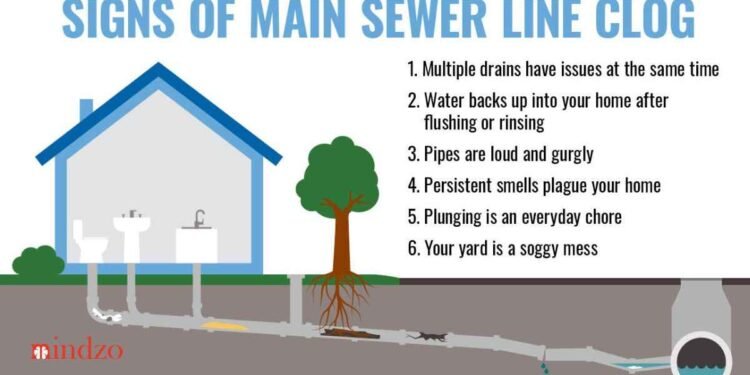1. Understanding Sewage Leaks
What Causes Sewage Leaks and How to Professionally Resolve it? Sewage leaks occur when wastewater escapes from pipes or sewer lines due to damage, blockages, or system failure. These leaks can lead to serious health and environmental problems if not handled promptly.
2. Common Causes of Sewage Leaks
Aging Pipes
Over time, pipes corrode and weaken, leading to cracks and leaks.
Tree Root Intrusion
Tree roots seek moisture and can infiltrate pipes, causing blockages and breakages.
Blockages and Clogs
Flushing non-degradable items like wipes and grease leads to clogs, increasing pressure on pipes.
Shifting Soil and Ground Movement
Earthquakes or soil erosion can shift pipes, causing them to crack or disconnect.
Poor Installation
Improperly installed pipes are more prone to leaks and failures over time.
3. Signs of a Sewage Leak
- Foul odors near drains or around the property.
- Slow drainage or recurring clogs.
- Unusual patches of lush grass or sinkholes in the yard.
- Mold growth due to increased moisture.
- Increase in pest activity.
4. Health Hazards of Sewage Leaks
- Bacterial Infections: Exposure to sewage can cause serious illnesses.
- Respiratory Issues: Mold growth from leaks can trigger allergies and asthma.
- Skin Irritations: Direct contact with contaminated water can cause rashes and infections.
5. How to Identify a Sewage Leak?
- Use a dye test to trace leaks.
- Check for unusual odors and wet spots.
- Conduct a smoke test to detect cracks in pipes.
- Call a professional for a sewer camera inspection.
6. DIY Methods for Temporary Fixes
- Use plumbing tape for minor leaks.
- Clear minor clogs with a plunger or drain snake.
- Apply epoxy to seal small pipe cracks temporarily.
7. When to Call a Professional?
- When leaks persist despite DIY fixes.
- If multiple drains in the house are backing up.
- When there’s extensive property damage or foul odors.
8. Professional Solutions for Sewage Leaks
Pipe Relining
A trenchless method that repairs pipes without excavation.
Hydro Jetting
High-pressure water removes clogs and cleans pipes.
Pipe Replacement
For severely damaged pipes, replacement is the best option.
9. How to Prevent Future Sewage Leaks?
- Avoid flushing non-degradable items.
- Schedule regular plumbing inspections.
- Plant trees away from sewer lines.
- Install a backwater valve to prevent backups.
10. Cost of Fixing a Sewage Leak
- Minor leaks: $150 – $500
- Major repairs: $1,000 – $4,000
- Full pipe replacement: $5,000+
11. Choosing the Right Plumbing Service
- Check online reviews and ratings.
- Verify licenses and certifications.
- Ask for detailed estimates before hiring.
12. Legal Responsibilities of Homeowners
- Homeowners are responsible for sewer lines within their property.
- Some cities offer assistance programs for repairs.
- Ignoring leaks can result in legal penalties.
13. Eco-Friendly Solutions for Sewage Leaks
- Use biodegradable drain cleaners.
- Opt for trenchless repair methods.
- Recycle wastewater through proper treatment systems.
14. The Importance of Regular Maintenance
- Schedule annual sewer inspections.
- Keep an eye on water bills for unusual spikes.
- Address minor issues before they escalate.
15. Final Thoughts
What Causes Sewage Leaks and How to Professionally Resolve it? Sewage leaks can be a messy and costly problem, but with the right knowledge, they can be prevented and resolved professionally. Regular maintenance, early detection, and professional intervention are key to keeping your sewage system in top shape.
Frequently Asked Questions (FAQs)
1. What should I do if I suspect a sewage leak?
If you notice foul smells or slow drains, conduct a dye or smoke test, and call a professional for inspection.
2. Can I fix a sewage leak myself?
Small leaks can be temporarily fixed with plumbing tape or epoxy, but professional repairs are recommended for long-term solutions.
3. How often should I inspect my sewer lines?
Experts recommend inspecting sewer lines every 1-2 years to detect early signs of leaks.
4. How much does professional sewage leak repair cost?
Costs range from $150 for minor leaks to $5,000+ for major repairs, depending on severity and method used.
5. Are sewage leaks covered by home insurance?
Coverage depends on your policy; sudden damages may be covered, but gradual wear and tear usually isn’t.




















